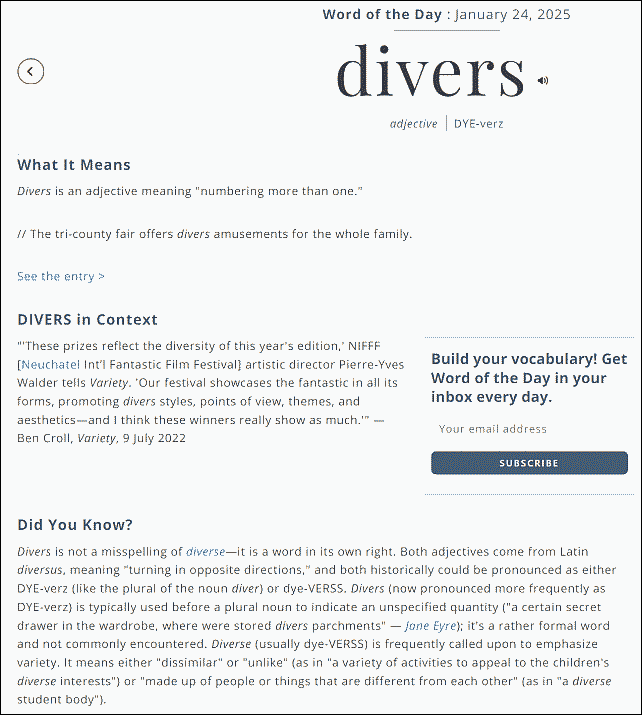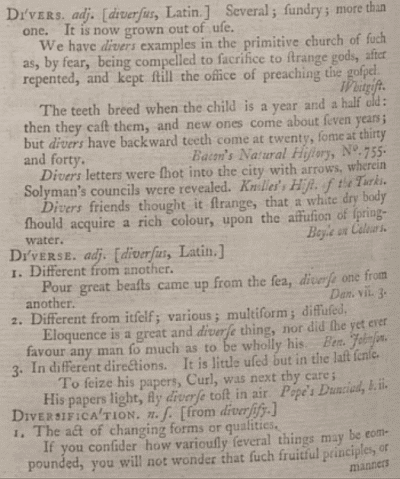2025-01-28 Tue
■ #5755. divers vs diverse は Johnson の辞書でも別見出し [johnson][adjective][pronoun][variant][doublet][note][wod][ari][bible]
昨日の記事「#5754. divers vs diverse」 ([2025-01-27-1]) の続編.昨日の記事を執筆した後,ヘルメイトの ari さんによるhel活 note 記事「#177 【WD】久しぶりの英語辞書の「今日のことば」。」を読んで知ったのだが,divers という単語が1月24日の Merriam-Webster: Word of the Dayで取り上げられていたとのこと.

divers と diverse について,1755年の Johnson の辞書を引いてみた.昨日の引用文で示されていた通り,各々の語が確かに別々に立項されている.そちらを掲載しよう.

Johnson の記述から,このペアの単語について気になった点を列挙する.
・ diverse のほうも divers とともに強勢は第1音節にあった(ただし現代でも両語にはいずれの音節にも強勢が落ち得るマイナー発音は聞かれる)
・ 意味の違いは divers は "more than one" で,diverse は "different" と単純明快
・ 当時すでに divers は使われなくなっていた
・ 例文をみると divers に不定代名詞としての用法があり,同じ例文には同用法の some もみえる
divers を用いた聖書の「使徒行伝」 (= the Acts of the Apostles) からの有名な1節として,"But when divers were hardened, and believed not, but spake evil of that way before the multitude, he departed from them, and separated the disciples, disputing daily in the school of one Tyrannus." (Acts 19:9) を挙げておこう.
2025-01-27 Mon
■ #5754. divers vs diverse [variant][pronunciation][latin][french][doublet][stress][spelling][adjective][polysemy][pronoun][doublet]
米国ではトランプ2.0が発足し,世界も予測不能のステージに入ってきている.この新政権では,DEI (= diversity, equity, and inclusion) の理念からの離脱が図られているとされる.この1つめの diversity は「多様性;相違」を意味するキーワードであり,英語にはラテン語からフランス語を経て14世紀半ばに借用されてきた.
この名詞の基体はラテン語の形容詞 dīversum であり,これ自体は動詞 dīvertere (わきへそらす,転換する)に遡る.それて転じた結果,「別種の;多様な;数個の」へ展開したことになる.
ところで,現代英語辞書には divers /ˈdaɪvəz/ と diverse /daɪˈvəːs/ とが別々に立項されている.綴字上は語尾に <e> があるかないかの違いがあり,発音上は強勢の落ちる音節および語末子音の有声・無声の相違がある.意味・語法としては,前者は古風・文学的な響きをもって「別種の;数個の」で用いられ,後者は主に「多様な」の語義で通用される.もともとは両者は互いに異形にすぎず,中英語期以降いずれの語義にも用いられてきたが,1700年頃に語形・意味において分化してきた.
divers /ˈdaɪvəz/ は「数個;数人」を意味する名詞・代名詞としても用いられるようになったためか,その語末子音は,名詞複数形の -s を反映するかのように /z/ へと転じた.また,diverse /daɪˈvəːs/ の発音と綴字は,ラテン語由来の adverse, inverse などと関連づけられて定着したものと思われる.
OED でも両語は別々に立項されているが,Diverse, Adj. & Adv. の項にて両語の形態と発音の歴史が詳細に解説されている.
Form and pronunciation history
The stress was originally on the second syllable, but was at an early date shifted to the first, although both pronunciations long coexisted, especially in verse. In early modern English divers (with stress on the first syllable) is the dominant form (overwhelmingly so in the 17th cent.), especially in the very common sense 'several, sundry, various' (see divers adj.) in which the word always occurs with a plural noun (the final -s coming to be pronounced /z/ after the plural ending -s, making the word homophonous with the plural of diver n.).
By the 18th cent. the senses of the word had come to be distinguished in form, with divers typically used to express the notions of variety and (especially) indefinite number (see divers adj. & n.) and diverse (probably by more immediate association with Latin diversus) the notion of difference (as in senses A.1 and A.3); thus Johnson (1755), Sheridan (1780), and Walker (1791), all of whom have two parallel entries. Both forms were typically stressed on the first syllable, and differed only in the pronunciation of the final consonant (respectively /z/ and /s/ ). The same formal and semantic distinction is reflected in 19th-cent. dictionaries, including Smart (1836), Worcester (1846), Knowles (1851), Stormonth (1877), Cent. Dict. (1889), and New English Dictionary (OED first edition) (1897). The latter notes at divers adj. (in sense 'various, sundry, several') that it is 'now somewhat archaic, but well known in legal and scriptural phraseology'; in this form the word is now chiefly archaic and used mainly in literary or legal contexts.
In the second half of the 19th cent. (as divers adj. was gradually becoming more restricted in use), the dictionaries begin to note an alternative pronunciation for diverse adj. with stress on the second syllable. This pronunciation probably continues the original one that had never entirely disappeared for this form, as is shown by examples from verse (compare e.g. quots. a1618, 1837 at sense A.1a, 1754 at sense A.3a). Knowles (1851) is one of the first dictionaries to note this pronunciation of diverse adj. (which, interestingly, he gives as the sole pronunciation); more commonly the two alternatives are given, as e.g. Craig (1882), who puts the pronunciation with initial stress first, and Stormonth (1877), Cent. Dict. (1889), New English Dictionary (OED first edition) (1897), who give priority to the pronunciation with stress on the second syllable; this has since become by far the more common pronunciation of the word.
Powered by WinChalow1.0rc4 based on chalow